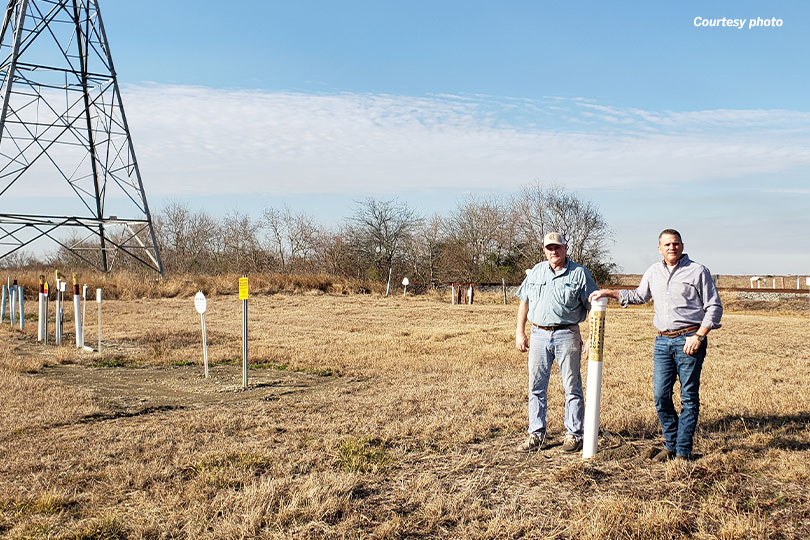The Texas Supreme Court earlier this year heard oral arguments in a case between a Brazoria County landowner and a subsidiary of Enterprise Product Partners.
At the heart of the case is the proper use of eminent domain.
It all began in 2015 when Terry Hlavinka was approached by Enterprise to acquire an easement for a pipeline. In 2016, Enterprise’s wholly owned subsidiary, HSC, served Hlavinka notice that it intended to condemn a 30-foot route across his property.
Hlavinka’s land, which lies between Chocolate Bayou and Halls Bayou in eastern Brazoria County, has more than four dozen different pipelines running across it. So, it wasn’t Hlavinka’s first time negotiating an easement.
“They basically offered us pennies on the dollar,” Hlavinka said. “We said no for a lot of reasons. It wasn’t market value. It wasn’t what a willing buyer and a willing seller would settle on.”
So, HSC filed condemnation proceedings, attempting to take the land with eminent domain authority.
Hlavinka challenged HSC’s offer in a Brazoria County court. But the trial court excluded Hlavinka’s testimony related to the damages and the methodology of valuation for the easement.
That wasn’t all.
HSC claimed common carrier status, which would allow the company to use eminent domain to obtain the property through condemnation proceedings.
The pipeline, called the Oyster Creek Lateral Project, would carry polymer grade propylene made by Enterprise in a six-inch pipeline from Texas City to a plant owned and operated by Braskem America, Inc., the sole Enterprise customer for this pipeline. There are no interconnects to the pipeline, and no other customers.
Under Texas law, to qualify as a common carrier with the power of eminent domain, the pipeline must serve the public. It cannot be built only for the builder’s exclusive use. Hlavinka argued this pipeline should not be considered a common carrier line.
“It was a private transaction between two companies, never intended to be available for the public,” he said.
Hlavinka also argued that the trial court in Brazoria County didn’t have jurisdiction over the matter because HSC was not a common carrier, and therefore, did not have the authority to use condemnation.
When the court ruled against Hlavinka, he appealed the court’s condemnation proceedings. Texas Farm Bureau (TFB) and Texas and Southwestern Cattle Raisers, along with several other agricultural organizations and private property rights groups, filed an amicus brief supporting Hlavinka.
“Farm Bureau and Cattle Raisers were the first ones to step up. You filed an amicus brief at the First Court of Appeals. I’d say that was a catalyst,” Hlavinka said.
The First Court of Appeals in Houston reversed a portion of the trial court’s judgment, ruling Enterprise had not presented evidence or public use, and the evidence of voluntary sales on Hlavinka’s property is relevant for purposes of establishing fair market value. Hlavinka noted that decision has helped other landowners in the state.
Although the legal wins have been big so far, justice does come with a price.
Hlavinka has been fighting the pipeline company for six years, investing a considerable amount of time, effort and money.
“I’ve learned a lot about the law and find it intriguing. I’ve negotiated a lot of pipeline easements over the last 20-30 years, so I think I had a pretty solid knowledge of what pipeline companies are allowed to do and what they’re not allowed to do,” Hlavinka said. “I would rather not have to go through this process and gain this much knowledge about the law, because it’s quite expensive. The Enterprise-HSC folks have at least four law firms working on this project. With billion dollar earnings every few months, the other side has virtually unlimited financial resources, but we are undeterred. ”
The Texas Supreme Court is expected to rule before its summer recess.
“Now, it’s going to be ultimately up to the Supreme Court to uphold our constitutional rights which requires that anyone using eminent domain strictly conform to law and that landowners receive adequate and just compensation for the property,” he said.
Private property rights
TFB has been advocating for eminent domain reform and was successful in the 87th Texas Legislature, helping establish new legislation to protect and improve landowner rights in negotiations with entities using eminent domain authority.
“Landowners shouldn’t have to spend as much time and money as Mr. Hlavinka just to get a company claiming eminent domain authority to offer what’s right and fair. That’s why we filed an amicus brief, because helping in this case can help determine how future cases are settled,” Regan Beck, TFB director of Government Affairs, said. “The First Court of Appeals’ opinion reinforced the importance of property rights and that landowners have a right to a fair process to determine adequate compensation for the taking of their land.”
Hlavinka said he’s heard from other landowners and lawyers who have used his case in mediation efforts to reach a settlement.
For more information on eminent domain resources, visit texasfarmbureau.org/eminentdomain.


I’m going through a similar situation with a electric utility that has no easement, used my land to put poles to feed a neighbor, fought against relocating poles to easement, finally did, now won’t pay damages, fair rent, and says is not liable under deceptive trade and practice act because I am not ” customer ” and had no contract. I argue Henderson vs CPL out of Corpus Christi is example of how I am a customer. New young attorney so proceeding devastatingly.
Gary Hlavinka
This helps other landowners in a long run, thanks!
Thank you for taking it this far Gary Hlavinka.